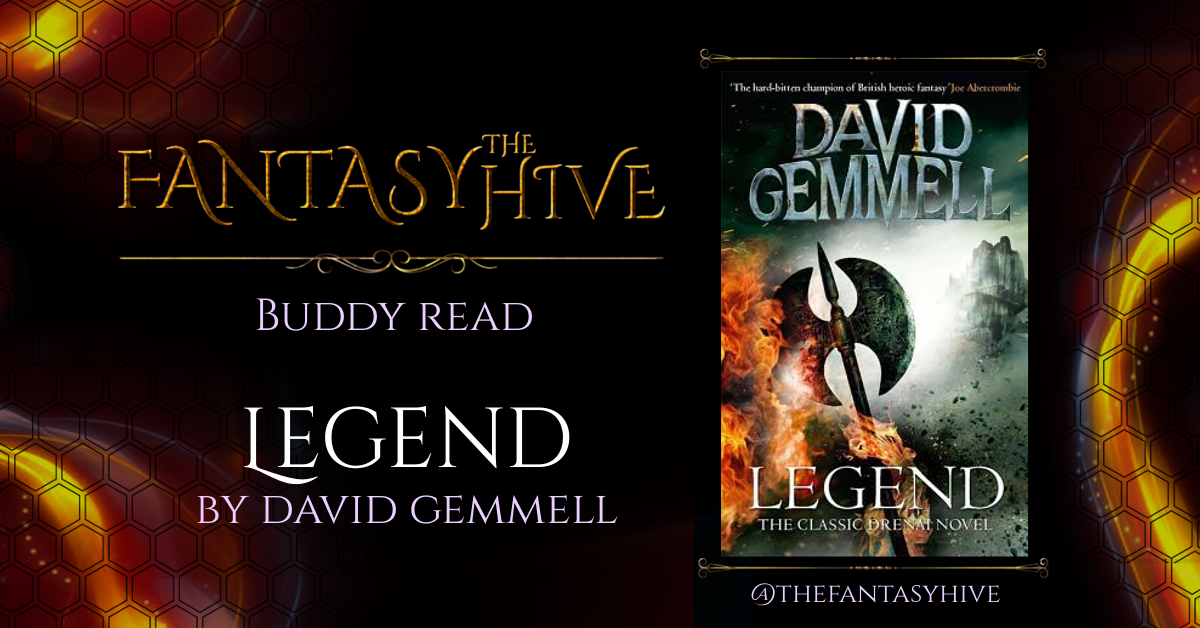The Hive Reads… Sorcerer to the Crown by Zen Cho
Welcome to the sixth instalment of our ‘Hive Reads’ feature! (You can read the others here.) After settling on Sorcerer to the Crown by Zen Cho as our June read, a bunch of us here at the Hive diligently noted down our thoughts whilst reading throughout the month. You can read the end result below! Though do beware: spoilers abound.
This month’s read is brought to you by the fabulous team of T.O. Munro, Julia Kitvaria Sarene, G.D. Penman, T L Greylock and Laura M. Hughes.
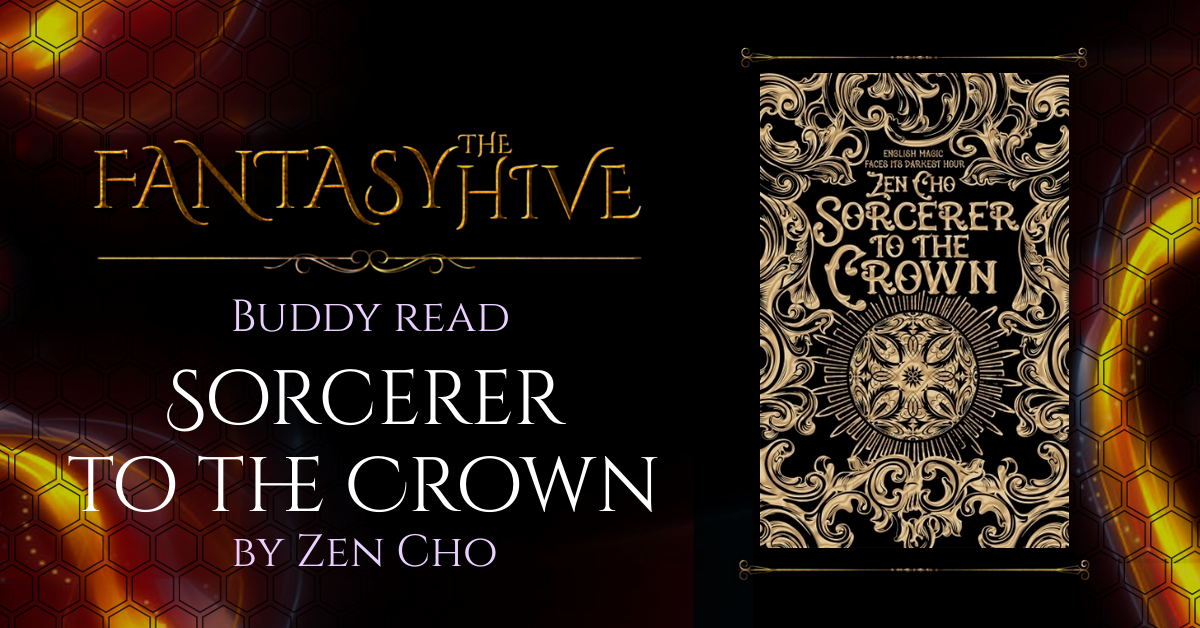
Laura M. Hughes: Welcome, everyone, to the latest Hive Read! This time we’re getting stuck into Sorcerer to the Crown by Zen Cho. As always, let’s begin with first impressions. What are everyone’s thoughts on the cover?
Julia Kitvaria Sarene: There are three covers for the book. I have the black one with the golden ornamental decorations. I really love both the look and the feel of it!
To me it hits the book very well, looking a bit regal and noble, without looking like a girly romance.
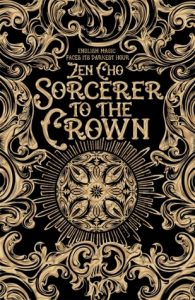 Laura: I have the gold-on-black edition too. It’s gorgeous! Especially in hardback. I’m not ashamed to say the cover is what sold me the book in the first place. Meeting Zen Cho in person last year was what really prompted me to want to read it, though. She came across as a very smart and genuine person.
Laura: I have the gold-on-black edition too. It’s gorgeous! Especially in hardback. I’m not ashamed to say the cover is what sold me the book in the first place. Meeting Zen Cho in person last year was what really prompted me to want to read it, though. She came across as a very smart and genuine person.
G.D. Penman: I had the red cover with a dragon up top. It didn’t sell the gilded-cage nature of the book as well as the others but by the end of the first page I was already too in love to care.
Taya (T.L. Greylock): I, too, have the red cover. I like the dragon, but the rest of the background detail looks quite flat and fake. I like the sound of this black and gold edition….
Laura: It’s super pretty! And shiny. Mmm… ahem. Anyway. Let’s move on to the book’s characters. What did everyone think of the two protagonists? Did you have a favourite? Are they believable? Sympathetic?
Kitvaria: I don’t remember the names as it’s been quite a while since I read it, so I have to go by descriptions… ?I loved both the main character who finds himself the new master of the sorcerers, who themselves would like nothing better than to get rid of the black stranger. I liked how he was both trying to fit in, and yet kept fighting for his position, not just giving up. Him staying down to earth, a bit awkward and yet doing his job.
I also liked the female main character who just was so lively and sure of herself and wouldn’t accept the place society put her in! And they work really well together.
Also really enjoyed the old mentor twist!
T.O. Munro: I felt a certain sympathy for Zacharias and the challenges thrown at him by his context and the thinly veiled hostility of his colleagues. An honourable man in a difficult situation that is not of his own making who is told:
“…your only defence against impertinence must be patience and courtesy…”
and later:
“Zacharias could not often afford the liberty of honest emotion.”
Ah, who amongst us has not had the crippling frustration of having to bite their tongue rather than say what they really think?
Laura: Oh, I think we can all definitely relate to that!
T.O.: Small spoiler alert. I love the relationship between Zacharias and Sir Stephen’s ghost, epitomised by this quote:
“Affection there had always been between them, whatever their disagreements – and there had been more of them than Zacharias had permitted Sir Stephen to know.”
There is also the fact that this is very much a re-imagined history, replete with all the injustices and prejudices of Georgian England (and a few extra ones as well). As an emancipated former slave, Zacharias experiences and navigates not just the hostility of his enemies but the obliviousness of his friends to the innumerable advantages their own race and position has given them. Quite a topical and contemporary issue for a story set two centuries ago in a parallel universe!
As an emancipated former slave, Zacharias experiences and navigates not just the hostility of his enemies but the obliviousness of his friends to the innumerable advantages their own race and position has given them. Quite a topical and contemporary issue for a story set two centuries ago in a parallel universe!
– T.O. Munro
Laura: Very true! And what did you think about the romance?
T.O.: I loved the atypical romance – I know Julia is not fond of romance in fantasy, but the gently teasing story here is so wonderfully different, watching the protagonists tiptoeing around a tangle of their own emotions and proprieties in a mire of utter Britishness (a bit like the Hugh Grant scene in Four Weddings and a Funeral) .
Think of those iconic but succinct declarations of SFF love, like The Empire Strikes Back:
Leia: “I love you!”
Han Solo: “I know.”
Or Outlander:
Claire Randall: “I love you.”
Hunky Jamie: “And I … you.”
And then we have Sorcerer to the Crown, where a delicate verbal dance ascends to this crescendo:
“You do love me?”
“Yes.”
“Then, you may as well know that in accepting your offer, my reasons accord with yours – that they could not be faulted, judged according to your principles.”
I so want to see the film of this.
G.D.: It is a testament to the quality of the writing that at no point throughout reading this book did I scream “just kiss already!” The romantic relationship that is gradually teased out of the dual leads is lovely, but it isn’t the sum of their relationship. There is so much more going on between the two of them than just attraction. The biggest delight of this book was seeing the contrast between the supremely proper Zacharias, carefully and calmly navigating the social mores of an intrinsically hostile civilisation, and the whirlwind of chaos in female form that is Prunella. They are diametrically opposed in so many ways, yet they clearly need the other to act as a counterbalance to their own worst natures. I love them both. And Rollo. And all of the supporting cast really.
The biggest delight of this book was seeing the contrast between the supremely proper Zacharias, carefully and calmly navigating the social mores of an intrinsically hostile civilisation, and the whirlwind of chaos in female form that is Prunella. They are diametrically opposed in so many ways, yet they clearly need the other to act as a counterbalance to their own worst natures. I love them both.
– G.D. Penman
Laura: I agree, Graeme. Both Prunella and Zacharias are exquisitely written. I loved them too!
Moving on to the book’s structure and pacing: did Sorcerer to the Crown keep you all turning the pages throughout? Why? (Or why not?)
Kitvaria: I for one was sucked in right from the start. The banter and humour kept me well entertained so the book felt fast and fun to me! I read the whole thing more or less in one go. Not very much actual action, more like a Jane Austen novel with magic! The scenes that had action in them (and that I remember) where well written, though. Often in books of this type the action scenes feel off. Here, they fit in.
The banter and humour kept me well entertained . . . like a Jane Austen novel with magic!
– Julia Kitvaria Sarene
Laura: I agree, Julia. For me, it was all about the characters, but the action – when it occurred – added tension and excitement. And fun!
T.O.: Yes, I liked the gentle tension. This book isn’t about swords and axes and slavering hordes of monsters. The conflict is about people and relationships, the icy snubbing of one person by another on account of race or gender or jealousy.
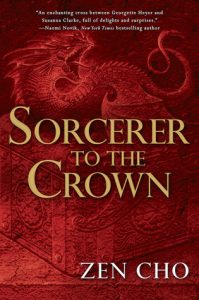
That being said, there are dangers lurking in the most unexpected places which turn quiet streets and cosy sitting rooms into scenes of life and death peril. Assassins abound and are indubitably bounders to boot, which contributes to a pace that becomes increasingly frenetic with switchbacks of action as the cool measured approach of Zacharias is in constant conflict with the chaos of Prunella.
G.D.: The structure, language and pacing of this book are the ways that it communicates the regency time-period. There have been a multitude of regency fantasy books, but very few of them read like a piece written by the authors of that time, and Cho really nails every detail.
I agree with T.O. that it is a real pleasure to see a fantasy story where the solution to the heroes’ woes lie in social maneuvering and wit, rather than swords and spells, and those brief moments of mortal terror throughout the book are fairly subdued compared to the slow, agonising grind of snubs and microaggressions.
There have been a multitude of regency fantasy books, but very few of them read like a piece written by the authors of that time, and Cho really nails every detail.
– G.D. Penman
Taya: I’m sorry to say that the Regency-era voice, vocabulary, dialogue, etc. didn’t quite hit the sweet spot for me–even sorrier to say that this was apparent within the first few pages. It’s strange–I ought to have liked it. But it felt a bit much at times and, as a result, tedious. Just a matter of taste, of course.
T.O.: The writing was smooth – an easy read, rather than a literary challenge – but I did have more occasions than usual to use the “define this word” feature in kindle or even google a word as Cho’s vocabulary reached beyond my experience (and my kindle’s). Who knew that froward is a word and not a typo! But those little tests enriched rather than disrupted my reading – and went on all through the book.
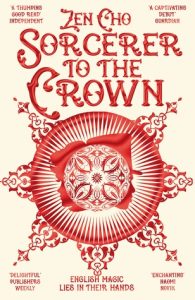 Taya: Once I’d reached the halfway point, I found that the style and the book as a whole did grow on me. However, because the book so closely follows a novel from the Regency period, I found there was no hurry to it, no moments when I was turning the pages faster because things were galloping along. Because the story adheres to Regency etiquette and style, things proceed at a relatively sedate pace and I had some difficulty with that. That’s not to say everything must be breakneck all the time, certainly; rather I felt the conflict (note, I do not say violence or action) could have been ratcheted up a bit more here and there throughout.
Taya: Once I’d reached the halfway point, I found that the style and the book as a whole did grow on me. However, because the book so closely follows a novel from the Regency period, I found there was no hurry to it, no moments when I was turning the pages faster because things were galloping along. Because the story adheres to Regency etiquette and style, things proceed at a relatively sedate pace and I had some difficulty with that. That’s not to say everything must be breakneck all the time, certainly; rather I felt the conflict (note, I do not say violence or action) could have been ratcheted up a bit more here and there throughout.
Laura: I agree that there wasn’t really a sense of urgency to the book, Taya. Normally, this would make me roll my eyes and start skimming pages, but I found in this case I didn’t really mind. A bit like when I read Jonathan Strange & Mr Norrell, I was happy to just accompany the characters wherever they went, no matter how long it took.
We’ve mentioned the historical nature of the book, and how that affected its pacing. Does anyone have any more thoughts on this, or on other aspects of Cho’s worldbuilding?
Kitvaria: The world didn’t feel very original to me, as I’ve seen all the ideas before – a Fae court, magic going missing, court wizards – but it still worked very well for me. Even though I knew all the single parts, it never felt like reading a carbon copy of any other book I read before, but held its own.
G.D.: We have certainly seen the different elements of this book before, but perspective is everything. All of the regency books that I have come across focus exclusively on aristocrats and frippery, they completely ignore the bloody foundations on which the British Empire was built. By placing our heroes outside of that pocket-universe of balls and finery, we get to see an awful lot more, including the rot underneath the gilding.
T.O.: Yes, I appreciated the historically authentic prejudices of race and gender, lurking behind a faux civility, that placed an additional challenge on the key point of view characters. I also saw some parallels between 18th century offices and institutions like The Astronomer Royal and the Royal Society.
Kitvaria: It was easy to settle into the world as it felt a bit like a Jane Austen book with magic in it. (I’m repeating myself here..) I felt right at home from the start!
T.O.: Yes, Julia, it seems we are not the only ones to notice an Austen connection – many of the blurbs draw the same parallel. This particular alternative history works very well for me. My love of reading/writing was kindled with the Hornblower novels of the Napoleonic era and I loved also Poldark, Jane Austen’s writing and Patrick O’Brien. So while I have (yet) to find any ship battles in the series, the milieu really appeals to me. Sort of like Pride Prejudice and Magic, or Poldark and Poltergeists.
You could almost say “It is a truth universally acknowledged, that an isolated country in the midst of a war, must be in want of a lot of magic.”
“It is a truth universally acknowledged, that an isolated country in the midst of a war, must be in want of a lot of magic.”
– T.O. Munro
G.D.: I can certainly see the resemblance to Austen, but the work reminded me a lot more of Oscar Wilde, more focused on the gentlemen in society, but also more ready to skewer the pomposity.
Laura: Comparisons to both Wilde and Austen are apt indeed. T.O. mentioned magic: what did you all think about the nebulous nature of Cho’s magic? (In comparison to the more rigid Sanderson-esque magic systems created by many other fantasy novelists?)
G.D.: I don’t feel that a more explained and Sanderson-esque magic system would have benefited this book in any way. The adoption of the mindset that “everything must be explained” has been a great detriment to the genre over the last few decades. Within this book magic is meant to be mysterious and humour is derived throughout the book by the ways that those mysterious workers of spells are little different from every other fool with too much power. More pressingly, magical power and balance isn’t actually all that important, because a character’s ability to toss a larger fireball than the others has no bearing on the plot.
Kitvaria: I personally would have liked the magic to be a bit more explained (how it works, what the limits are…), but that is personal preference. The focus in this one is definitely more on characters and their interactions than on the magic.
Laura: Speaking of which… what are everyone’s overall thoughts on the plot itself?
Kitvaria: That was for me the weakest part of the book. Not bad, but it took a while to settle and for me to get a sense of direction. Not just as in it being a mystery slowly revealed, but more like it meandered a bit at the start. It does come together and flow later in the book though.
Even though I call it the ‘weakest’ part – it still was quite good, just not as perfectly written for me as the rest!
T.O.: Totally agree with you there, Julia. The book is full of lovely characters, witty writing and a well developed milieu, but the plot, while serviceable, is not at the same high calibre as those other elements. It has its twists and turns, some of them a little sharper than one might like, and it’s not a badly plotted story – it’s just the plot appears to be more an envelope that the characters stretch and distort rather than a framework which gives a rigid structure to the story. But then maybe that is what happens when you have such delightful characters – it takes a strong authorial hand to keep them in line (like a sorcerer seeking to manage a freshly hatched familiar).
The plot appears to be more an envelope that the characters stretch and distort rather than a framework which gives a rigid structure to the story. But then maybe that is what happens when you have such delightful characters – it takes a strong authorial hand to keep them in line (like a sorcerer seeking to manage a freshly hatched familiar).
– T.O. Munro
G.D.: The plot is most certainly shaped by the characters, but it is strange to see that decried as a fault rather than a virtue. The book revolves around the way that the characters are marginalised by society, and the different, often intersecting ways, that those marginalisations occur.
The plot didn’t unfold in the most linear way, but the narrative was constantly offering us up new mysteries in the first half and satisfying us with answers to those mysteries in the second. The plot arc may not have been as “grand” as some of the book’s contemporaries, but it benefits from the tightness of focus, and the world Cho has built benefits greatly from this being just one of many stories that are occurring within it.
Laura: Some mixed views so far! Anyone have any outright issues with the plot or premise?
Taya: I found the whole Janda Baik plotline tedious. I think I have a difficult time believing that Britain in this ‘historical’ period would have even bothered to acknowledge the Janda Baik fly buzzing about–much less swat said fly and admit being annoyed by it.
A second point of contention I have is a bit difficult to describe and I think you’ll see why quite quickly. On the whole, I find it more than convenient that not once in the history of magic in Britain (apparently) has anyone stopped to consider that women might be capable, indeed, powerful. Now, obviously given the historical proof that women in positions of authority have been–and continue to be–feared and given the lengths to which men have gone–and continue to go–to suppress, malign, and utterly destroy those women, well, I can see why this notion that women are too weak to handle magic would be so pervasive. And yet…I still come back to the idea that it’s too convenient for the plot. It’s a serious conundrum for me.
Laura: Interesting points, Taya, and fair ones, I think. I know you also had issues with some of the reveals later in the book…
Taya: Everything–literally everything that happened–stemmed from the fact that Zacharias, in the moment after Sir Stephen’s death, couldn’t contemplate the thought of Leofric getting the remuneration he was promised. I mean, sure, it’s an unpleasant notion, but this was disappointing. Did Zacharias really believe he was preserving Sir Stephen for some sort of afterlife? I find it difficult to entertain the idea that a magician, a man who has seen and done things that would be considered inconceivable by most, would cling to any notions of souls and heaven and some sort of salvation. I much prefer Prunella’s practicality–a division of the limbs and the soul to the strongest.
Laura: I must admit I found myself frustrated at Zacharias for this. He means well, and I’m fond of the idea that he refuses to break a promise, no matter how damaging, but… yeah.
Moving on! Any quotations from the book that particularly amused or resonated with anyone?
T.O.: Lots of little turns of phrase, like “He sat swollen with purpose.”
I also particularly enjoyed:
“Prunella might have no compunction in indulging in a show of weeping, but she had far too much pride to give way to real tears in the presence of a stranger.”
Laura: Lovely quote! And what about recommendations for similar books for readers who particularly enjoyed Sorcerer to the Crown? My immediate thought is Jonathan Strange and Mr Norrell by Susanna Clarke, of course – one of my favourite books of all time.
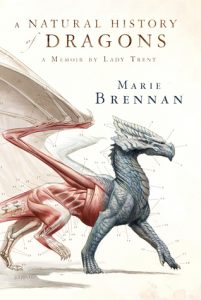 Kitvaria: Different in plot and world, but similar for the wit and banter and a woman doing her own thing is Marie Brennan’s A Natural History of Dragons.
Kitvaria: Different in plot and world, but similar for the wit and banter and a woman doing her own thing is Marie Brennan’s A Natural History of Dragons.
Laura: Oh, that’s a brilliant rec, Julia. Seconded!
T.O.: It is the idea of a border in England somewhere between the mundane England and the magical fairyland that put me in mind of Neil Gaiman’s Stardust, where the village of Wall stood on the cusp between two worlds. It is interesting to see how far Cho’s vision of that situation differs from Gaiman’s.
In style, I would again say it reminds me of Jane Austen – though maybe partly it is conjuring up the same world as much as a similarity of writing.
Another parallel is how far Prunella’s experience in the school for gentlewitches parallels Sarah Crewe’s experience in “The Little Princess” By Frances Hodgson Burnett – in some broad themes.
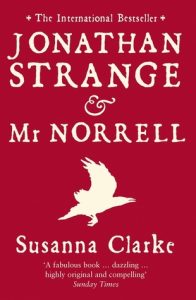
And another story it reminds me of is Senlin Ascends by Josiah Bancroft. The developing relationship between studious unwordly woe-beset teacher Zacharias and precocious rebellious student Prunella reminds me of those glimpses Bancroft gave us into Thomas Senlin’s relationship with his former student and now wife Marya. I’m glad Cho’s story brings these two people together as beautifully and entertainingly as Bancroft separated his pair of lovers.
G.D.: The obvious comparison for the plot would have to be Jonathan Strange and Mr Norrell by Susanna Clarke but that book had some considerable pacing problems.
The Parasol Protectorate series by Gail Carriger might be a better match, featuring a similar world of hidden supernatural creatures being treated primarily as a nuisance by mainstream society; although they lean more heavily into romance. Likewise, you could do worse than to pick up the (roaring-20s) Green Men series by KJ Charles.
Laura: Thanks for sharing so many brilliant insights, everyone. Some great recommendations, too!
That’s it for this month! Thanks again to our wonderful reading team of G.D., T.O., Julia, Taya and Laura. Be sure to drop by soon to see what we (and others) have to say about Legend by David Gemmell!
